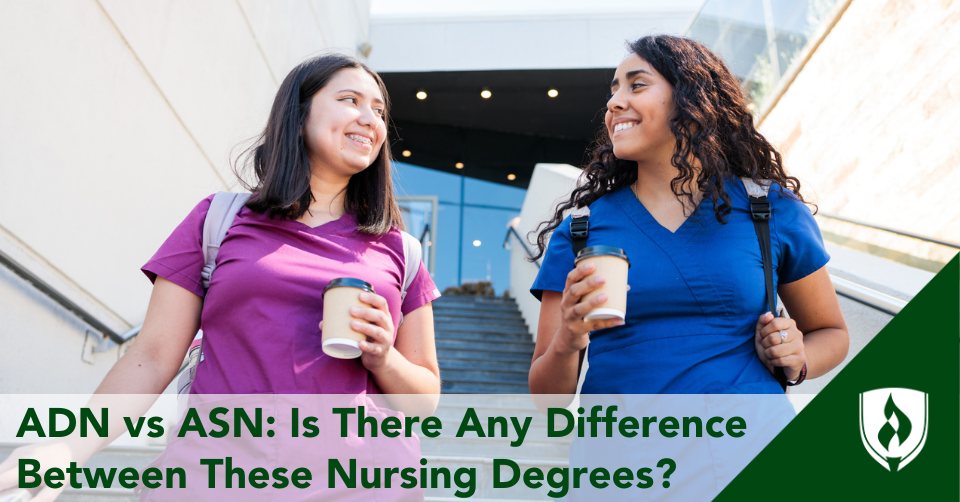
Assessing patients. Administering medications. Providing care. A nursing career is where you want to end up, but you're still figuring out how to get there.
Ready to become an RN?
Explore Rasmussen University's ADN program and start your journey todayYou're looking into nursing degree programs, but you're running into some confusion. Your main question: What is the difference between an ADN (Associate Degree in Nursing) vs. an ASN (Associate of Science in Nursing)? Both terms keep popping up across your search, but you're struggling to determine if they're actually any different from each other.
The simplest answer? They're not. These two acronyms both represent a nursing program that prepares you to become a registered nurse.
But the longer answer is that they have slight disparities. An ASN is a type of ADN—and it's not the only nursing degree program that falls under that designation. At many schools and universities, including here at Rasmussen University, the terms ADN and ASN are virtually interchangeable.
But you may be wondering why—and when—this is the case.
What makes a nursing program an ADN?
Those who complete the Rasmussen University ADN program will be awarded an Associate of Science in Nursing (ASN) or an Associate of Applied Science in Nursing (AAS) depending on which state their program was completed in.
That's what their diplomas will say, and that's the specific credential they will hold. There are a few things that determine whether a given nursing degree program is considered an ADN, and all of them apply to your typical ASN program or AAS program. Here are the main things that make a nursing program an ADN, and some of the biggest similarities between ADNs and ASNs specifically.
4 things to understand about ADN and ASN programs
1. ADN vs ASN: degree level
This one may seem obvious, but in order to be considered an Associate Degree in Nursing, the nursing program needs to operate at the associate's level. This differentiates ADN, ASN and AAS (Associate of Applied Science) programs from programs like a Bachelor of Science in Nursing (BSN), Master of Science in Nursing (MSN), Doctor of Nursing Practice (DNP), Practical Nursing (LPN) and Post-Graduate Nursing Certificates.
2. ADN vs ASN: program setting
ADN programs work in a range of settings: many community colleges, vocational schools, hospital-based nursing programs and some four-year institutions offer ADNs. Though there can be some slight differences in the curriculum based on the program setting (more on that later), pretty much any ADN program—and therefore any ASN program—will stem from one of these academic settings.1
3. ADN vs ASN: typical curriculum
An ADN program is a two-year degree program that consists of both core nursing classes and hands-on clinical training. Since an ADN program can lead to an ASN degree designation, this is true for “both” degree acronyms.
Most ADN programs will be fairly balanced in their approach to both, though some ASN programs and AAS programs that are specifically offered in vocational schools or through hospital programs may be slightly more clinically-focused.1
Your typical ADN program will be structured around training students in the following core nursing courses and professional skills. Here are some sample ADN program course titles and descriptions offered at Rasmussen University to give you an idea of what's typically taught in an ADN program.
Nursing Care of the Older Adult
Examines how personal attitudes and beliefs about aging impact healthcare for older adults and provides students with resources that promote autonomy and safety in aging patients.
Mental and Behavioral Health Nursing
Explores internal and external factors that impact a patient’s balance and well-being, and studies the effects of stress and mental health issues on a patient and their family.
Professional Nursing Skills I
Takes place in a supervised lab setting and teaches students the skills that provide basic care and comfort to patients, including those with musculoskeletal, integumentary and elimination disorders.
Leadership and Professional Identity
Examines professional nursing leadership and management responsibilities, teaches evidence-based practices to improve patient outcomes and studies regulatory standards of nursing through a legal and ethical lens.
4. ADN vs ASN: program goals
All ADN programs and ASN programs share the following essential goals and desired outcomes. The most significant one? Preparing students to take the NCLEX-RN® (National Council Licensure Examination).1
Take the NCLEX-RN®
Any associate-level nursing program that prepares students to sit for the NCLEX-RN® national certification exam is considered an ADN. Passing this exam is the gateway to becoming a registered nurse and entering the field in a full-fledged, hands-on nursing role.
ASN and AAS programs need to prepare their students for RN licensure.
Start working as a registered nurse
Once they pass the NCLEX-RN, ADN graduates will be prepared to pursue a range of RN roles. Graduates may work across a variety of healthcare teams and settings—from long-term care facilities to hospitals (depending on location), to physician’s offices, to private medical clinics, to home healthcare services.
Consider further education
The great thing about ADN programs and ASN programs is that their well-rounded approach to nursing basics and clinical training makes them ideal jumping off points to pursue further nursing education—starting with a bachelor's degree.
If an ADN graduate chooses to continue their education beyond an ADN/RN, they'll be well-prepared to do so. By nature of their balanced approach, ADN programs align particularly well with BSN programs—and it doesn't have to end there.
From an RN to BSN program (RN to BSN) to a Master of Science in Nursing (MSN) to a Doctor of Nursing Practice (DNP), an ADN can be the initial stepping stone to lifelong learning.1
When can an ASN differ from an ADN?
An ASN is often used interchangeably with ADN. ASN will have the same essential goal of preparing students to sit for the NCLEX-RN and obtaining RN licensure. But at certain schools and certain program settings, an ASN program may differ slightly in one area: the core curriculum.
At schools like Rasmussen University that offer interchangeable ADN/ASN programs, the curriculum will be a balanced blend of traditional coursework and clinicals. But ASN programs offered at vocational schools or hospital-based nursing programs may be more focused on clinical training than classwork.1
In more clinically-focused ASN programs, students will spend more time in healthcare facilities and skills labs, and less time in lecture halls and discussion rooms. Taking a look at the required credits for different ASN programs you’re considering can be an easy way to gauge how clinically-driven each one will be.
The bottom line? At some schools and in some states, ASN programs are more clinically-focused than standard ADN programs.
What does more clinically-focused mean? Simply put, this means more clinical hour requirements. How much more will depend on the program you choose.
What are the other types of ADNs?
An ASN isn't the only degree that's considered an ADN. Another type of nursing degree that falls under the ADN designation is an AAS (associate of applied science). AAS nursing degrees are two-year programs that prepare graduates to sit for the NCLEX-RN, but these are more career-focused than ADNs and ASNs.
While some ASN programs will be more clinically-driven, all AAS programs are.1
AAS programs are geared specifically towards students who are looking to enter the nursing field immediately after earning their RN (rather than pursue further education).
If an AAS graduate decides to pursue their BSN degree, they'll likely need to complete more additional coursework requirements than an ASN graduate. That's the general gist of the difference between these associate degrees. For more specific details on the differences between an AAS and an ADN, check out AAS vs. ADN: What to Choose When You Want to Become a Nurse.
Building the skills that matter to work as a registered nurse
ADN programs, whether they lead to an ASN or AAS degree designation, need to help you learn how to save lives, work in a nursing team and prepare for many different healthcare environments.
This work isn’t easy—but it matters. And we all know it matters. The American public has rated nursing as the most ethical, most trusted industry for 22 straight years.2
If you want to help people, you can hardly choose a more meaningful area of study. Nurses in associate’s programs learn patient care, professional confidence, critical thinking and a well-rounded perspective.
Does that sound right for you?
Now that you understand the differences between an ADN, ASN and AAS, you can look into nursing programs with a little more confidence. Now, zoom back a bit and get a better picture of what the process from here to working as a registered nurse would look like.
Advance your nursing career with our flexible ADN program.
Learn more and apply nowRelated Articles:
- What Can You Do with an Associate's Degree in Nursing?
- How to Become a Registered Nurse: A Simple Step-by-Step Guide
- What is an ADN, And Does It Make Sense For Your Nursing Career Goals?
- AAS vs. ADN: What to Choose When You Want to Become a Nurse
NCLEX-RN® is a registered trademark of National Council of State Boards of Nursing, Inc.
1Kathleen Gaines, What are the Differences Between ADN, ASN and AAS Nursing Degrees?, (accessed March 2024), ADN, ASN, AAS Nursing Degrees | Nurse.org
2America's Most Trusted: Nurses Continue to Rank the Highest, (Jan.22, 2024), https://www.nursingworld.org/news/news-releases/2024/americas-most-trusted-nurses-continue-to-rank-the-highest/




